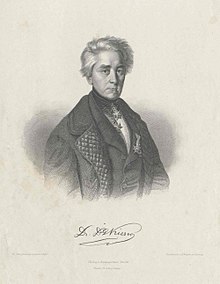Dietrich Georg Kieser


Dietrich Georg Kieser , from 1862 Dietrich Georg von Kieser (born August 24, 1779 in Harburg / Elbe , † October 11, 1862 in Jena ) was a German doctor of natural philosophy . Among other things, he worked as a general practitioner, well doctor, university lecturer and psychiatrist .
Life
Dietrich Georg Kieser was the son of pastor Christoph Ludwig Kieser (1742–1831) and his wife Sophie geb. Warmers (1745-1817). After attending grammar school in his hometown, Kieser began to study medicine in Göttingen in 1801 . Just three years later, he completed his studies with a doctorate. From May to August 1804 he attended lectures by the philosopher Friedrich Wilhelm Joseph Schelling in Würzburg .
Then he settled in Winsen an der Luhe and practiced there as a doctor. In 1806 he accepted an offer from Northeim and became a city and country physician there. In 1812 he was appointed associate professor at the University of Jena ; as such, from 1813 he also worked as a “well doctor” in the newly opened health resort Berka / Ilm . Alongside Johann Wolfgang von Goethe , Kieser played a key role in the creation of this health resort .
The French campaign in 1814/15 saw Kieser as a volunteer. In the course of this campaign he was promoted to the Prussian colonel doctor. As such, he headed the large military hospitals in Liege . After the end of the war he taught again at the University of Jena, and in 1824 he was promoted to full professor of medicine. He advocated gymnastics, which was frowned upon during the restoration period, and opened a gymnastics area where students and citizens of the city met. In 1816 the German Academy of Natural Scientists Leopoldina accepted him as a member and promoted Kieser to its adjunct two years later. Together with his colleague Carl August von Eschenmayer , he published the journal Archive for Animal Magnetism from 1817 . In 1817 he took part in the Wartburg Festival.
In 1821 Kieser married Amalie, a daughter of his colleague Johann Christian Reil, in Halle . Kieser was also politically active. From 1831 to 1848 he was a member of the state parliament of Saxony-Weimar . As its vice-president, he took part in the Frankfurt pre-parliament in 1848 . As a politician as well as a scientist, he vigorously advocated treatment of the mentally ill in which rehabilitation is preferred to isolation. In doing so, he also laid the foundation for psychiatry as an academic subject.
Since Kieser's possibilities at the university were limited, he founded a private surgical ophthalmic clinic in 1831 and headed it until 1847. From that year he was director of the insane, sanatorium and nursing home in Jena. He held this office until 1858. In addition, Kieser ran the Sophronisterium , a clinic for the mentally ill, in Jena - also privately . Kieser also took part in the organizational tasks of the Salana and was Rector of the Alma Mater in the summer semesters of 1837, 1845, 1848, and in the winter semester of 1827, 1831 . From 1848 he was promoted to "Director Ephemeridium" at the Leopoldina, ie he acted as editor of this scientific journal. On his 75th birthday, his university honored him with the honorary title of Dr. phil. hc
In 1858 the Leopoldina elected him to succeed Christian Gottfried Daniel Nees von Esenbeck as its new president. Kieser took over a difficult position from his predecessor. He chose Scheuchzer I as the company name and headed the company until the end of his life.
Dietrich Georg Kieser's grave is in the Johannisfriedhof in Jena .
Kieser's early scientific work was mainly based on empirical results. In his main work "Elements of Psychiatry" he also advocates the thesis of the somatic condition of all mental disorders. In the penetration of empirical observation and speculative interpretation, Kieser stands in a row with Johann Friedrich Blumenbach , Johann Wolfgang von Goethe , Karl Gustav Himly , Lorenz Oken and the neurologist Carl Eberhard Schelling .
Fonts (selection)
- Commentatio physiologica de anamorphosi oculi (Medical dissertation Göttingen 1804)
- Basic features of human pathology and therapy (1812)
- Basic features of the anatomy of plants (1815)
- On the emancipation of the criminal in the dungeon (1845)
- Of passions and affects (1848)
- Elements of psychiatry (Breslau and Bonn, 1855)
- Journal Archive for Animal Magnetism (1817 ff.)
literature
- Walter Brednow : Dietrich Georg Kieser. His life and work (= Sudhoffs archive . Supplement 12). Steiner, Wiesbaden 1970.
- August Hirsch : Kieser, Dietrich Georg von . In: Allgemeine Deutsche Biographie (ADB). Volume 15, Duncker & Humblot, Leipzig 1882, pp. 726-730.
- Susanne Müller: Dietrich Georg von Kieser's (1792–1862) understanding of illness. Medicine between science and philosophy of nature around 1800. University, Heidelberg 1985 (medical dissertation).
- Hans Sohni: Kieser, Dietrich Georg von. In: New German Biography (NDB). Volume 11, Duncker & Humblot, Berlin 1977, ISBN 3-428-00192-3 , p. 595 f. ( Digitized version ).
- Matthias Steinbach : economists, philanthropists, humanitarian. Professor Socialism in the Academic Province. Metropol, Berlin 2008, ISBN 978-3-938690-84-0 .
- Werner E. Gerabek : Kieser, Dietrich Georg. In: Werner E. Gerabek u. a. (Ed.): Encyclopedia of medical history. De Gruyter, Berlin / New York 2005, ISBN 3-11-015714-4 , p. 737 f.
Remarks
- ^ Matthias Steinbach : Economists, Philanthropists, Humanitarian. Professor Socialism in the Academic Province. Metropol, Berlin 2008, pp. 86–91.
- ^ Matthias Steinbach : Economists, Philanthropists, Humanitarian. Professor Socialism in the Academic Province. Metropol, Berlin 2008, pp. 107-134.
Web links
| personal data | |
|---|---|
| SURNAME | Kieser, Dietrich Georg |
| ALTERNATIVE NAMES | Kieser, Dietrich Georg von |
| BRIEF DESCRIPTION | German physician and psychiatrist |
| DATE OF BIRTH | August 24, 1779 |
| PLACE OF BIRTH | Harburg / Elbe |
| DATE OF DEATH | October 11, 1862 |
| Place of death | Jena |
